The "Savoy" in Hamburg
The first European Todd-AO cinema |
Read more at
in70mm.com
The 70mm Newsletter
|
| Written by: Gerhard Witte, Berlin |
Date: 13.11.2009 |
 Oklahoma! (1955), was the first Todd-AO film shown in the Savoy cinema when it opened in 1957. Picture taken from the book Filmstars im Schaukasten by Manfred Christ. Oklahoma! (1955), was the first Todd-AO film shown in the Savoy cinema when it opened in 1957. Picture taken from the book Filmstars im Schaukasten by Manfred Christ.
Only a few minutes away from Hamburg's central railway station, at Steindamm 54, on the 14th March 1957, a new state of the art cinema opened. The renowned architects were Joachim Glüer and Paul Schlüter. As well as the cinema, the building contained a hotel, also called Savoy and an underground garage for 60 cars.
|
More in 70mm reading:
More Savoy Adverts Supplement to the
story of Hamburg's First Todd-AO Theatre
Das "Savoy" in Hamburg
"Savoy" Annoncen / Adverts
The Grindel Filmtheater
Das Grindel Filmtheater
DP70s in Germany
The Todd-AO Saga
Internet link:
youtube.com
|
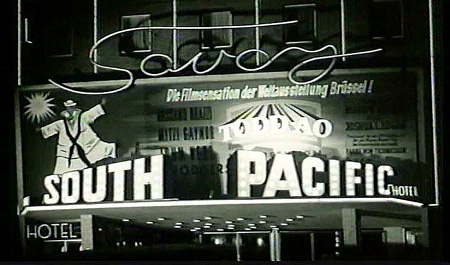 The following year, in 1958, the Savoy had another great success with South Pacific (1958). Picture taken from Gerhard Witte's collection. The following year, in 1958, the Savoy had another great success with South Pacific (1958). Picture taken from Gerhard Witte's collection.
The cinema foyer had a box office, a lounge, bar and 2 cloakrooms.
The owner was Herbert Steppan, an experienced cinema entrepreneur.
|
|
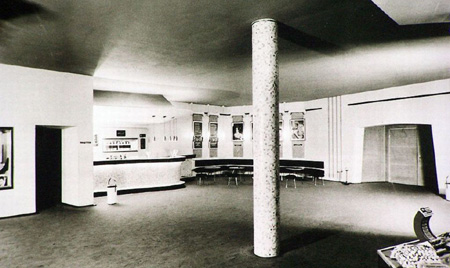 The foyer of the Savoy cinema. Picture by Herbert Wedemeyer. The foyer of the Savoy cinema. Picture by Herbert Wedemeyer.
Whilst planning the building of the Savoy cinema Mr. Steppan went to the USA and visited a cinema in Syosset on Long Island in order to see the new Todd-AO (American Optical Company) widescreen process.
When Savoy opened in 1957 it had
957 seats and two of the latest Philips DP70 projectors to run 35mm 4 track and 70mm with 6 track magnetic sound films. There were the usual five speaker positions each side of and across the screen and the single auditorium track was fed to twelve speaker units around the audience.
|
|
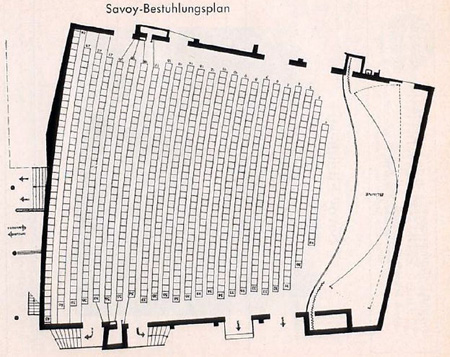 All that equipment cost Mr. Steppan around 150 000 DM ( that would be 76 700 EUR today) and even one Todd-AO lens was 10 125 DM ( or 5170 EUR). All that equipment cost Mr. Steppan around 150 000 DM ( that would be 76 700 EUR today) and even one Todd-AO lens was 10 125 DM ( or 5170 EUR).
Hamburg became the first city in Europe to be able to show
Todd-AO films
in a new cinema built to Todd-AO specifications.
Deutsche Philips Gmbh.
delivered the new curved Perlux screen,
which measured 17,4 x 7,6 m. At the time of the opening of the Savoy,
the contemporary trade press informed about a, most likely exaggerated,
screen size of 20 x 8.4 metres.
The Todd-AO system was specified by Mike Todd, who was married to Elizabeth Taylor. He wanted a single lens large screen system, which would be more flexable than the complicated three film "CINERAMA" process. In conjunction with the American Optical Company the long neglected 70mm system was revived, at first restoring cameras built during the 1930s, and they also developed the technique of originating on 65mm negative and printing to 70mm with 6 tracks of magnetic sound.
|
|
 The cinema. Pictures by Herbert Wedemeyer. The cinema. Pictures by Herbert Wedemeyer.
The Savoy opened with the 35mm 4 track CinemaScope film "The Brave One/Roter Staub/Les clameurs se sont tués/El Bravo/La più grande corrida" (1956) by US director Irving Rapper.
|
|
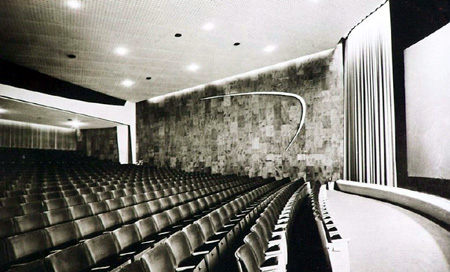 The cinema. Pictures by Herbert Wedemeyer. The cinema. Pictures by Herbert Wedemeyer.
A small boy saves the life of his pet bull when it is sent into the ring, where, during the fights, "Red Dust" ("Roter Staub") is dispersed. Dalton Trumbo won the 1956 Oscar for Best Screenplay, or rather, because he was blacklisted, his nom-de-plume won! The wonderful score by Victor Young was one of his last works. And the landscapes of Mexico were rendered superbly by cinematographer Jack Cardiff.
|
|
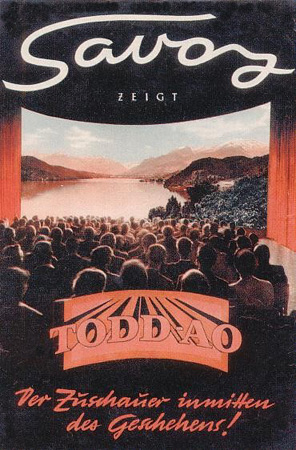 Todd-AO in all it's glory. Picture taken from the book: "Mach dir ein paar schöne Stunden - Das Hamburger Kinobuch" by Michael Töteberg and Volker Reißmann. Todd-AO in all it's glory. Picture taken from the book: "Mach dir ein paar schöne Stunden - Das Hamburger Kinobuch" by Michael Töteberg and Volker Reißmann.
"The Brave One" starred Michel Ray, whose last film was "Lawrence of Arabia" (1962), in which he played the boy "Farraj". The main feature (in 35mm) was preceded by the 70mm short "The Miracle of Todd-AO" (1956), in order to introduce the system.
With 4 perfomances each day, there were around 15,000 admissions in the opening week. Some weeks later the first 70mm Todd-AO film "Oklahoma!" (1955) was shown, later followed by Mike Todd's "Around the World in Eighty Days" (1956),
not in 70mm but in 35mm, most likely a
CineStage (1:2.21) reduction print with 4-Channel-Stereo Magnetic Sound and
with 3-Channel Perspecta in the surround.
Mr. Steppan, the owner of the cinema was inspired to create his own trophy, The Hummel Award. At the Gala Premiere of “South Pacific” in 1958 he presented it to Maria Schell, the sister of Maximilian Schell. Mrs. Schell then went to the USA to pass on the trophy to George P. Skouras of 20th Century Fox for his contribution, as co-Producer, to the Box Office of the film.
|
|
70mm premiere |
|
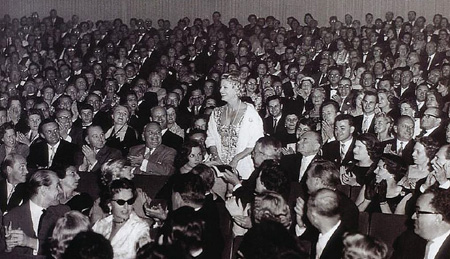 Marika Rökk (a famous German star of that time) in the Savoy. Picture taken from the book: "Mach dir ein paar schöne Stunden - Das Hamburger Kinobuch" by Michael Töteberg and Volker Reißmann. Marika Rökk (a famous German star of that time) in the Savoy. Picture taken from the book: "Mach dir ein paar schöne Stunden - Das Hamburger Kinobuch" by Michael Töteberg and Volker Reißmann.
With "Ben Hur" (1959), "Barabbas" (1961), "Lawrence of Arabia" (1962), "Cleopatra" (1963), "The Great Race" (1965), "The Bible" (1966), "The Sand Pebbles" (1966), “War and Peace” (1967), "Doctor Dolittle" (1967), "Star!" (1968), "Hello, Dolly!"(1969), "Patton" (1970) and many others, The Savoy continued to present the major 70mm productions of the era.
|
|
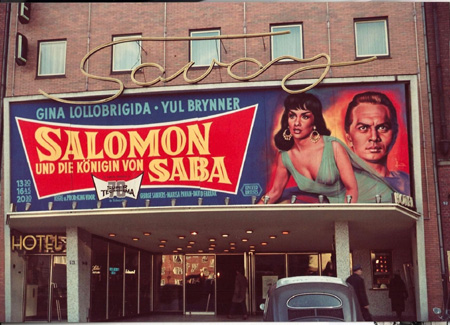 The queen of Sheba bedazzled the people of Hamburg in the year 1960 "Salomon and Sheba"(1959). Picture taken from Volker Reißmann´s collection. The queen of Sheba bedazzled the people of Hamburg in the year 1960 "Salomon and Sheba"(1959). Picture taken from Volker Reißmann´s collection.
The beginning of 1963 saw the premiere of the epic "Spartacus" (1960). |
"Savoy" Annoncen / Adverts |
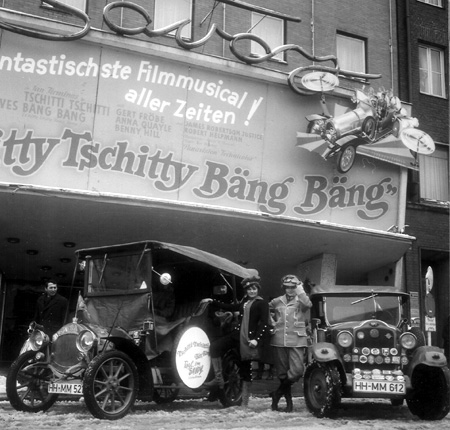 In winter 1968/1969 a car is flying over the city of Hamburg "Chitty Chitty Bang Bang" (1968). Picture taken from Volker Reißmann´s collection. In winter 1968/1969 a car is flying over the city of Hamburg "Chitty Chitty Bang Bang" (1968). Picture taken from Volker Reißmann´s collection.
"My Fair Lady" (1964), with the wonderful and lovable Audrey Hepburn was a great success and ran for a whole year.
The all time record, however, was set by William Wyler's monumental "Ben Hur" (1959) which ran for 118 weeks.
|
|
History |
|
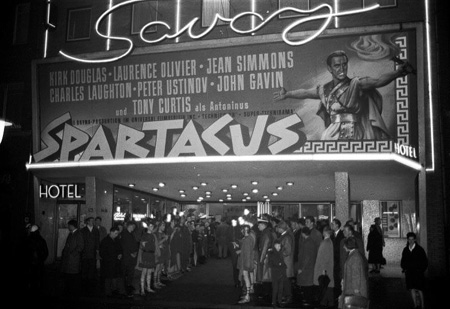 Pictures taken from Volker Reißmann´s collection. Pictures taken from Volker Reißmann´s collection.
In 1960 the founder of the cinema, Herbert Steppan, became seriously ill and handed the business management over to Walter Jonigkeit from 1960 to 1978.
Mr. Jonigkeit was a Berliner cinema institution and head of the famous
Berliner Delphi Filmpalast am Zoo, which celebrated its 60th anniversary in
November 2009. Mr. Jonigkeit still supervised his "child" the "Delphi" at
the proud age of 102. He passed away on 25 December 2009.
He began his career in the Silent Era and in 1932 managed his first cinema, Berlin's first repertory cinema Kamera in the Unter den Linden and his second cinema Die Kurbel followed in 1937.
In January 1974 at the age of only 59 Herbert Steppan died.
|
|
More screens |
|
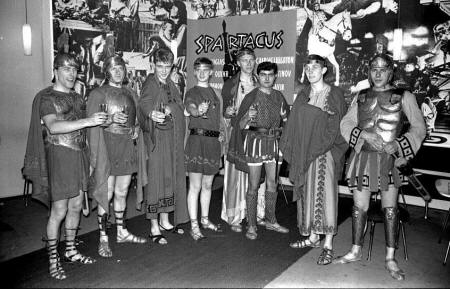 Pictures taken from Volker Reißmann´s collection. Pictures taken from Volker Reißmann´s collection.
Click image to see enlargement
1978 Ufa-Chief Heinz Riech took on the lease of The Savoy and in 1980 converted it to five small cinemas.
Cinema 1 with 461 seats
Cinema 2 with 218 seats
Cinema 3 with 138 seats
Cinema 4 with 89 seats
Cinema 5 with 76 seats
The rebuilding was completed within 21 days. The original auditorium was divided and the bar and parts of the foyer were incorporated into the new small cinemas. Cinema 1 and Cinema 3 were equipped with Dolby sound systems.
Mr. Riech also took care of Ingeborg Steppan-Herzog, widow of Mr. Steppan. She became manager of the theatre from 1980 to 1992.
Heinz Riech died on the 11th January 1992. He was responsible for the administration of 453 cinemas in 67 German cities and he was succeeded in the leadership of the Ufa-Theater AG by his only son Volker Riech.
|
|
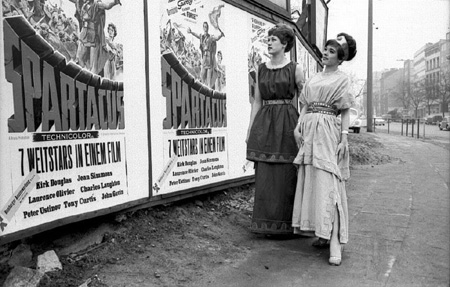 Pictures taken from Volker Reißmann´s collection. Pictures taken from Volker Reißmann´s collection.
By 1994 the time for these cinemas had passed. An expensive rebuilding programme removed the 3 small cinemas, thus restoring the foyer, and also removed the subdivision of the main auditorium. All that was left was the old large cinema and a new second cinema in the Souterrain: Savoy Atelier. The decor of the large cinema was altered with the addition of colourful drapery. But the renovation was unsuccessful and custom declined dramatically. The Ufa-Kinokonzern had problems and in the middle of 1998 it was decided to close the cinema. The last film in the Savoy was shown on the 17th December 1998. It seemed that its fate was sealed. The ownership passed to a real estate company: Berliner-Filmtheater-Betriebe.
|
|
Further uses |
|
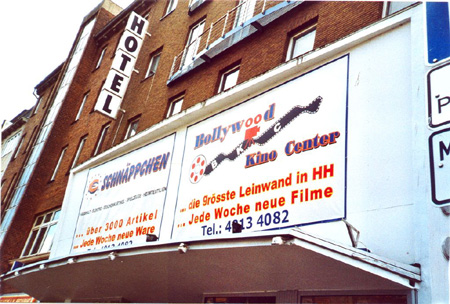 Here still used as a cinema called "Bollywood Kino Center" (BKC). Here still used as a cinema called "Bollywood Kino Center" (BKC).
In 1999 the building was rented to a businessman named Harris Patscha. Only Indian and Turkish films were shown, mostly without subtitles. Performances details were not published in newspapers but were distributed on flyers in foreign shops and restaurants.
|
|
 Here, no longer films were shown. The cinema was used as a
store. Pictures taken from Gerhard Witte´s collection. Here, no longer films were shown. The cinema was used as a
store. Pictures taken from Gerhard Witte´s collection.
This era ended in the summer of 2003, when a new owner opened an oriental bargain shop in the former foyer. For reasons of structural decay and fire risk the building was no longer usable as a cinema. It became, sadly, merely a store, which was especially unfortunate as it had been renovated only 10 years previously.
|
|
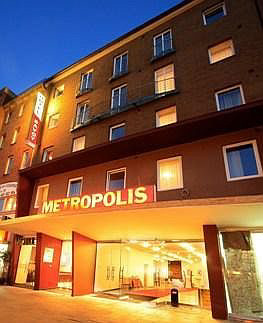 A "new" cinema named "Metropolis" at the Hamburger Steindamm 54. Pictures taken from Stefan Reich´s collection. A "new" cinema named "Metropolis" at the Hamburger Steindamm 54. Pictures taken from Stefan Reich´s collection.
The building was now owned by property developers who intended to demolish it and build an office block.
|
|
New hope, new salvage |
|
 Between 2003 and 2008, the Savoy existed as, The Hamburger called it, a ghost cinema - a sleeping beauty. After a renovation which allowed it to pass fire regulations it was reopened in August 2008, but without Savoy-Atelier. Between 2003 and 2008, the Savoy existed as, The Hamburger called it, a ghost cinema - a sleeping beauty. After a renovation which allowed it to pass fire regulations it was reopened in August 2008, but without Savoy-Atelier.
The Metropolis, the cinema of the Kinemathek Hamburg e.V.ld, was demolished in the summer of 2008. Until it is, hopefully, rebuilt on its original site in the Dammtorstrasse in 2011/2012, they needed a temporary home for 3 years, so they took over the Savoy.
|
|
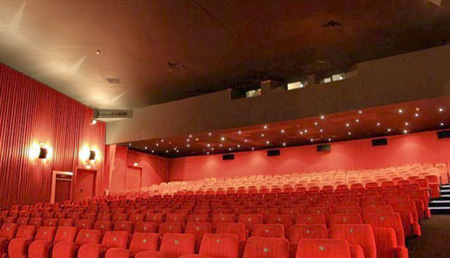 There are rumours that in 2003 the Savoy had a private screening of "Oklahoma!" (1955) in Todd-AO 70mm using an archive print supplied by a collector. There are rumours that in 2003 the Savoy had a private screening of "Oklahoma!" (1955) in Todd-AO 70mm using an archive print supplied by a collector.
There is no longer a Philips DP70 in the projection booth - they were removed in 2003/2004.
|
|
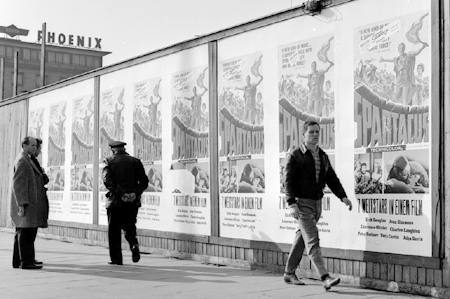 So, now it is unfortunately not possible to present 70mm films on the still surviving large curved screen. When the Metropolis cinema is successfully reinstated the word is that the old Savoy might be granted a new lease of life...When I was a youngster, I was so lucky to live in Hamburg. So, now it is unfortunately not possible to present 70mm films on the still surviving large curved screen. When the Metropolis cinema is successfully reinstated the word is that the old Savoy might be granted a new lease of life...When I was a youngster, I was so lucky to live in Hamburg.
In the Savoy I rode on the back of a camel, following Lawrence of Arabia through the Nefud desert accompanied by the wonderful music of Maurice Jarre.
The cinema was a beautiful place to escape for a while from the normal course of life...
Many thanks to Stefan Reich and in particular to Volker Reißmann and Thomas Hauerslev for their cordial help to make this report possible.
|
|
Book Sources |
|
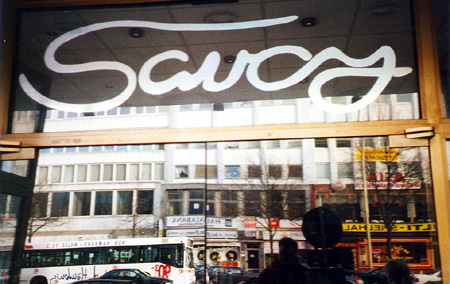 Volker Reißmann: 'Vom Premierentempel zum Geisterkino' Hamburger Flimmern, Nr.11 (Sept. 2004) Volker Reißmann: 'Vom Premierentempel zum Geisterkino' Hamburger Flimmern, Nr.11 (Sept. 2004)
'Mach dir ein paar schöne Stunden - Das Hamburger Kinobuch' by Michael Töteberg and Volker Reißmann
And in remembrance of Manfred Christ, 'Filmstars im Schaukasten' who died in 2005. He wrote many valuable books on film.
|
|
| |
|
Go: back - top - back issues - news index
Updated 13-11-09 |
|